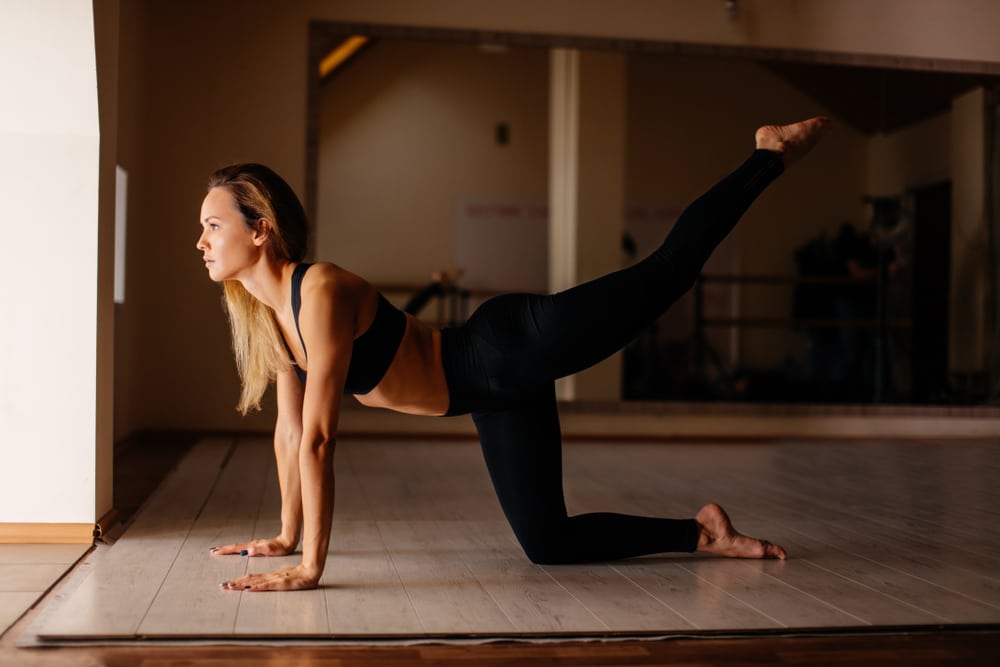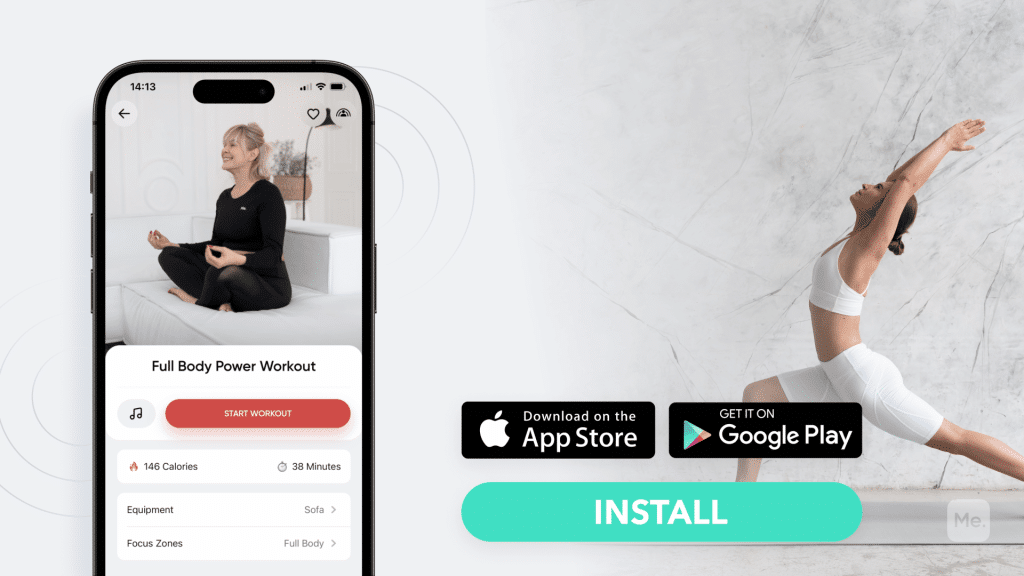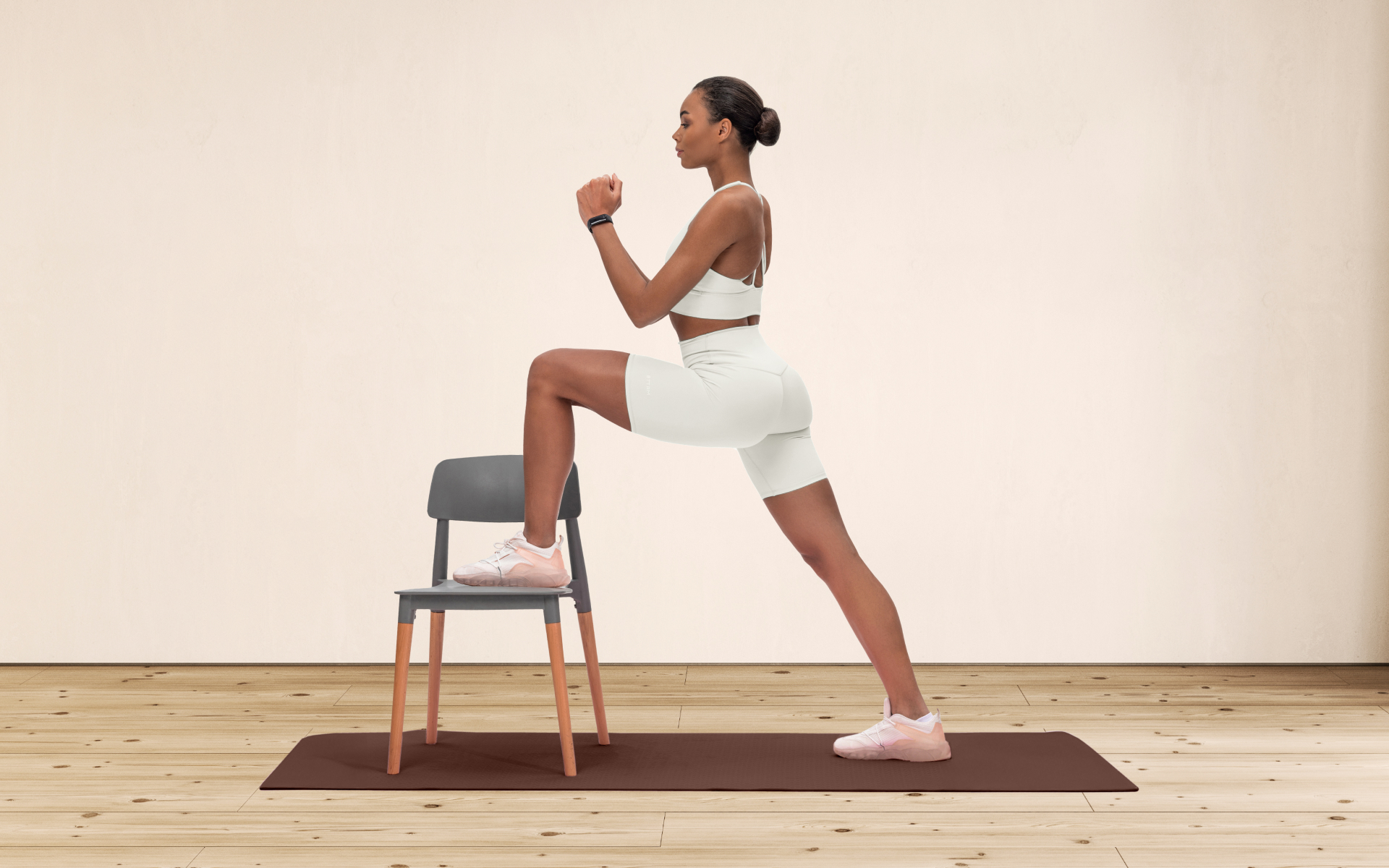To beginners, we like to say it like this; how much time you must spend in the gym is how much time you can spare. Any type of physical activity is beneficial and will have some sort of positive effect on your body, especially if you’re consistent with it. No wonder the Centers for Disease Control and Prevention has recommendations for minimum amounts of any physical activity for optimal health (2). That said, if you’re looking for specific results, you will need to adjust your workouts and duration as needed. At the same time, you don’t want to be in the gym for hours on end. You want to get the best results in the least amount of time possible, and that means finding the sweet spot for how long you should workout to build muscle. In this guide, we dive into the science behind how long you should work out to build muscle, explaining why working out for an hour or more isn’t always the best way.
Get your personalized
meal plan!
How Does Muscle Grow?
Muscle growth is a result of increased tension and metabolic stress on the muscle fiber. When you exercise, your muscles are exposed to mechanical tension which causes microtears in the muscle fiber. As your body repairs and rebuilds these fibers, they become stronger and larger to better handle increased tension.
Additionally, exercise leads to an increase in metabolic stress. This is caused by lactic acid buildup in the muscle cells during intense and prolonged exertion. The lactic acid causes metabolic stress, which triggers muscle adaptation and growth.
Several conditions must be met to sustain muscle growth:
Progressive Overload
To continue making progress, you must gradually increase the intensity of your workouts. There’s an aspect of consistency, as well. You can’t train at maximum intensity every workout; instead, you should focus on progressively increasing your training volume over time to ensure your muscles are exposed to adequate tension.
Rest And Recovery
Muscles don’t grow while you’re exercising; they grow while you rest. We’re most concerned about rest in between sets and workouts, but adequate sleep each night is also important.
Adequate Nutrition
Maintaining a balanced and healthy diet is essential to providing your muscles with the fuel they need to grow. Protein is especially important for muscle growth (1). By understanding and applying these components, you can maximize your efforts in the gym and make sure that each workout is beneficial.
Read More: Farmers Carry Workout: Benefits, Muscles Worked & More
How Long Should You Workout A Day To Build Muscle?
The answer depends on how you’re training and other factors such as your goals, experience, nutrition, and recovery. Generally speaking, workouts that last from 45 minutes to an hour, 3-4 days per week are ideal for building muscle.
The workout itself should consist of compound exercises that engage multiple muscle groups. Intensity is important, and you should aim to lift heavier weights over time with proper form. Aim to complete 3-4 sets of 8-12 repetitions with 45-90 seconds of rest in between sets.
You should also take active rest days or engage in light activity such as walking, yoga, or foam rolling. This will help flush out lactic acid buildup and promote recovery without placing too much strain on your muscles.
Of course, this is just a general guideline and you should adjust your workout as needed to suit your goals. When deciding how long you should workout each day, consider the following:
1. Recommendations For Minimum Activity
The Centers for Disease Control and Prevention (CDC) recommends that adults get at least 150 minutes of moderate-intensity aerobic exercise per week. That works out to about 30 minutes of exercise, 5 days a week or 1 hour of exercise 3 days a week (2).
More vigorous aerobic exercise can be substituted, and it’s recommended to get between 75 and 90 minutes of it weekly. However you divide it up, the important thing is to get moving and make sure you incorporate some form of physical activity into your routine.
If you’re using weight training as your primary form of exercise, both the CDC and the American College of Sports Medicine (ACSM) recommend performing at least 2 days of resistance training each week (4).
Each session should include 8-10 exercises targeting the major muscle groups and last for about 30 minutes. Coupled with a clean diet, 2 days is enough to see results and make progress.
Note, these are the bare minimum recommendations for improving cardiovascular health and preventing disease risk factors. It won’t be enough to build a lot of muscle, but it’s a good place to start.
2. How Much Time You Have
Many people make the mistake of setting an over-ambitious goal and then trying to work out for too long. When they fail to reach their goals, they give up and start the cycle all over again.
If you really want to build muscle and make consistent progress, it’s better to start with a realistic goal that fits your current schedule and lifestyle. Slowly add more activity over time as you become more accustomed to physical activity.
For example, if you’re just starting out, it might be better to start with 3 days at 30 minutes each rather than trying to commit to 5 days at an hour each. That way you’re making sure that you get some form of exercise without putting too much strain on yourself.
We should emphasize that the most achievable goals are SMART; Specific, Measurable, Achievable, Relevant, and Time-based. Emphasis on the achievable part, because otherwise it will just be an empty promise that’s doomed to fail.
If you wish to free yourself from all the extra pounds that have been weighting you down for way too long, start using the BetterMe app and overhaul your entire life!
3. Your Fitness Level
Did you know that beginners can get impressive results with much less work than they need? It’s true—when you’re just starting out, your body is super efficient at adapting to the stress of exercise.
As long as your workouts are intense and you’re getting enough rest, you should be able to build muscle with just 3 days of 45 minutes each.On the flip side, if you’ve been lifting for years and want to take your game to the next level, you’ll need to put in more work.
Note that more work doesn’t necessarily mean more time spent at the gym. Not only because there’s a limit to how hard you can push yourself, but also because more time means more stress and the risk of overtraining.
What we’re saying is, time spent in the gym should only increase as your fitness level does.
4. The Intensity Of Your Workout
An unpopular opinion – intensity outweighs time. A simpler way to put it is that quality trumps quantity when it comes to exercise. You don’t need to be in the gym for hours on end to make progress. Instead, you need to focus on performing exercises with the right form and pushing your body to its limits during your workout.
Let’s paint a picture with the story of two lifters; Jack and John who have the same routine. While Jack is at the gym, he spends the time in between sets chatting up chicks, scrolling on his phone and watching what others are doing. He doesn’t time his rest periods and takes as long as he needs to finish his sets. He needs a little over an hour to complete his workout.
John, on the other hand, is focused and puts in enough effort during his sets that he needs a full minute of rest in between. He takes the time to really focus on his form and pushes himself to complete as many reps as he can. He spends exactly forty five minutes to finish his routine.
It might seem that Jack worked harder because he spent more time in the gym, but the truth is that John achieved way more due to his focus and intensity.
The moral of the story? How intense your workout is matters way more than how much time you spend lifting weights to build muscle.
5. Your Training Style
Finally, the type of exercises and training style you choose will also have an effect on how much time you need to spend in the gym.
There are two types of training styles; bodybuilding and powerlifting.
Bodybuilding is focused on building muscle size while Powerlifting is focused on increasing strength. While both styles can be used to build muscle and strength, they require different approaches.
For example, bodybuilding focuses on compound exercises with moderate weight and higher rep ranges to exhaust the muscle. It requires a brief warm up and short rest periods in between sets. It can also be done more frequently as you’re not pushing yourself to the limit each time.
So, the workout length is shorter but the cumulative time spent in the gym per week may be longer.
Powerlifting on the other hand is focused on heavy weight and low rep ranges to trigger muscle growth. It requires extensive warm ups and longer rest periods in between sets to ensure that you can lift as much weight as possible.
It’s also typically done less frequently since you’re pushing yourself to your limits each time. So, the individual workout length is longer but the cumulative time spent in the gym per week will be shorter.
Read More: How To Max Out The Military Press Muscles Worked
How To Make The Most Of Your Time In The Gym
With all that said, it’s important to remember that how you spend your time in the gym is just as important as how much time you spend. We’ve discussed the importance of intensity and training style, but there are a few other things that you can do to get the most out of your time in the gym.
1. Hone In On Your Nutrition and Supplementation
No matter how much you work out, if you’re not giving your body the fuel it needs to recover and build muscle, you won’t see much progress.
Nutrition is your foundation for building muscle and it’s important to make sure you’re eating enough of the right foods to fuel your workouts and recovery (3).
On top of that, certain supplements can be helpful in aiding muscle growth and recovery, so make sure you do your research and find the best ones for you.
Recommendations for nutrition and supplementation can vary depending on your goals, but these general guidelines should help you get started:
- Eat a balanced diet that includes lean protein, complex carbohydrates, healthy fats, and lots of fruits and vegetables.
- Aim for at least 1-1.5g of protein per pound of body weight.
- Supplement with creatine, BCAAs, and glutamine for better performance and recovery.
- Eat the right amount of calories for your goals.
2. Track Your Progress
Tracking your progress is important so that when you make a decision about how much time you spend in the gym, you have concrete evidence to back it up. There are several measures you can use to track your progress when lifting weights, such as:
- Strength: How much weight you can lift
- Muscular endurance: How long you can hold a certain weight
- Hypertrophy: How much muscle size you gain
- Speed of execution: How fast you can move the weight
- One Rep Max: How much weight you can lift for one rep
By tracking these measures, you can see how your workouts are progressing and determine when it’s time to make a change.
Yanking yourself back in shape has never been so easy with our game-changing fitness app! Start transforming your life with BetterMe!
3. Switch Up The Intensity Before You Switch Up The Time
Before you decide to add more time into your gym schedule, it’s important to try and maximize your current routine. That means really pushing yourself during each workout and making sure you’re challenging your muscles as much as possible.
You can increase your workout intensity by:
- Adding weight
- Increasing reps
- Shortening rest periods
- Doing more sets
- Utilizing drop sets or supersets
- Working out with a partner or trainer to push yourself
Once you’ve hit your upper limit for intensity, then it might be time to consider adding more time into your gym schedule.
Frequently Asked Questions
How Long Should You Workout A Day To Build Muscle?
The amount of time you spend in the gym each day will depend on your goals, but generally speaking, 45-60 minutes per day is enough for most people to build muscle.
Is Working Out Every Day Bad?
It can be, depending on the type of workouts you’re doing and how much rest you’re getting. It’s important to make sure you have enough rest in between workouts, and to only do intense workouts a few times per week.
Is It Better To Workout For Longer Or Shorter Periods Of Time?
It will depend on your goals and how intense your workouts are, but generally it’s better to focus on quality over quantity. That means doing shorter, more intense workouts that are tailored to your goals and making sure you give your body enough time to recover in between.
How Often Should You Workout To Build Muscle?
You should aim to work out 3-4 times a week, with at least one day of rest in between sessions. That will give your body time to rest and rebuild muscle. If you’re short on time, even 2 intense sessions per week can be enough.
Can You Build Muscle Lifting 3 Times A Week?
Yes, it is possible to build muscle by lifting 3 times a week. With the right routine and nutrition, you can make significant progress in a relatively short period of time. Just make sure to push yourself in each workout and get enough rest to ensure you get the most out of each session.
What Is The Best Workout Schedule For Building Muscle?
The best workout schedule for building muscle will depend on your goals and how much time you have to dedicate to the gym. Generally speaking, a split routine that includes a day for different muscle groups, e.g. chest, back, legs, etc., is best for maximizing muscle growth.
The Bottom Line
How long you should workout to build muscle depends on various factors, such as your goals and current fitness level. Tracking your progress is important to ensure you’re making the most out of each workout and keeping your body challenged.
Before you decide to increase the amount of time in your gym schedule, try increasing the intensity of your workouts and make sure you get enough rest in between sessions.
DISCLAIMER:
This article is intended for general informational purposes only and does not serve to address individual circumstances. It is not a substitute for professional advice or help and should not be relied on for making any kind of decision-making. Any action taken as a direct or indirect result of the information in this article is entirely at your own risk and is your sole responsibility.
BetterMe, its content staff, and its medical advisors accept no responsibility for inaccuracies, errors, misstatements, inconsistencies, or omissions and specifically disclaim any liability, loss or risk, personal, professional or otherwise, which may be incurred as a consequence, directly or indirectly, of the use and/or application of any content.
You should always seek the advice of your physician or other qualified health provider with any questions you may have regarding a medical condition or your specific situation. Never disregard professional medical advice or delay seeking it because of BetterMe content. If you suspect or think you may have a medical emergency, call your doctor.
SOURCES:
- Dietary Protein and Muscle Mass: Translating Science to Application and Health Benefit (2019, nih.gov)
- How much physical activity do adults need? (2022, cdc.gov)
- Nutrition and Muscle Recovery (2021, nih.gov)
- Physical Activity Guidelines (n.d., acsm.org)













